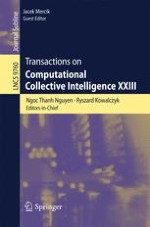2016 | OriginalPaper | Buchkapitel
Voting and Communication When Hiring by Committee
verfasst von : Paula Mäkelä
Erschienen in: Transactions on Computational Collective Intelligence XXIII
Verlag: Springer Berlin Heidelberg
Aktivieren Sie unsere intelligente Suche, um passende Fachinhalte oder Patente zu finden.
Wählen Sie Textabschnitte aus um mit Künstlicher Intelligenz passenden Patente zu finden. powered by
Markieren Sie Textabschnitte, um KI-gestützt weitere passende Inhalte zu finden. powered by
